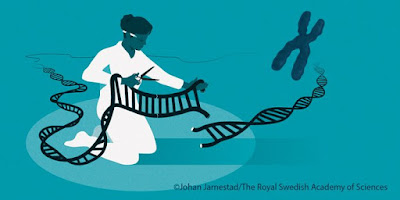The Royal Swedish Academy of Sciences has decided to award the Nobel Prize in Chemistry 2020 to Emmanuelle Charpentier, Max Planck Unit for the Science of Pathogens, Berlin, Germany and Jennifer A. Doudna, University of California, Berkeley, USA “for the development of a method for genome editing”.
Emmanuelle Charpentier and Jennifer A. Doudna have discovered one of gene technology’s sharpest tools: the CRISPR/Cas9 genetic scissors. Using these, researchers can change the DNA of animals, plants and microorganisms with extremely high precision. This technology has had a revolutionary impact on the life sciences, is contributing to new cancer therapies and may make the dream of curing inherited diseases come true.
Emmanuelle Charpentier, born 1968 in Juvisy-sur-Orge, France. Ph.D. 1995 from Institut Pasteur, Paris, France. Director of the Max Planck Unit for the Science of Pathogens, Berlin, Germany.
Jennifer A. Doudna, born 1964 in Washington, D.C, USA. Ph.D. 1989 from Harvard Medical School, Boston, USA. Professor at the University of California, Berkeley, USA and Investigator, Howard Hughes Medical Institute.
Prize amount: 10 million Swedish kronor, to be shared equally between the Laureates.
On 27 November 1895, Alfred Nobel signed his last will and testament, giving the largest share of his fortune to a series of prizes, the Nobel Prizes. As described in Nobel’s will one part was dedicated to “the person who shall have made the most important chemical discovery or improvement”. Learn more about the Nobel Prize in Chemistry from 1901 to 2020.
112 Nobel Prizes in Chemistry have been awarded since 1901. It was not awarded on eight occasions: in 1916, 1917, 1919, 1924, 1933, 1940, 1941 and 1942.
63 Chemistry Prizes have been given to one Laureate only.
24 Chemistry Prizes have been shared by two Laureates.
25 Chemistry Prizes have been shared between three Laureates.
The Nobel Prize in Chemistry has been awarded to 186 Laureates* 1901-2020. As Frederick Sanger has been awarded twice, there are 185 individuals who have received the Nobel Prize in Chemistry since 1901.
The youngest Nobel Laureate in Chemistry is Frédéric Joliot, who was 35 years old when he was awarded the Chemistry Prize in 1935, together with his wife, Irène Joliot-Curie.
The oldest Nobel Laureate in Chemistry to date is John B. Goodenough, who was 97 years old when he was awarded the Chemistry Prize in 2019. He is also the oldest Laureate to be awarded in all Prize categories.
Female Nobel Laureates in Chemistry
Of the 185 individuals awarded the Nobel Prize in Chemistry, seven are women so far. Two of these seven women, Marie Curie and Dorothy Crowfoot Hodgkin, were awarded unshared Chemistry Prizes.
1911 – Marie Curie (also awarded the 1903 Nobel Prize in Physics)
1935 – Irène Joliot-Curie (daughter of Marie Curie and wife to Frédéric Joliot)
1964 – Dorothy Crowfoot Hodgkin
2009 – Ada Yonath
2018 – Frances H. Arnold
2020 – Emmanuelle Charpentier
2020 – Jennifer A. Doudna
Multiple Nobel Laureates in Chemistry
Marie Curie- Physics 1903, Chemistry 1911
Linus Pauling- Chemistry 1954, Peace 1962
Frederick Sanger- Chemistry 1958, Chemistry 1980
Linus Pauling- Chemistry 1954, Peace 1962
Frederick Sanger- Chemistry 1958, Chemistry 1980
Linus Pauling is the only person who have been awarded two unshared Nobel Prizes.
The Curies were the most successful “Nobel Prize family”. The husband-and-wife partnership of Marie Curie and Pierre Curie were awarded the 1903 Nobel Prize in Physics. Marie Curie herself was awarded the Nobel Prize a second time, receiving the 1911 Nobel Prize in Chemistry. Marie and Pierre Curie’s eldest daughter, Irène Joliot-Curie, was awarded the 1935 Nobel Prize in Chemistry, together with her husband, Frédéric Joliot. The younger daughter, Ève Curie, worked for the UNICEF and was married to Henry R. Labouisse. He accepted the Nobel Peace Prize on behalf of UNICEF in 1965.
visit:- reviewguys.in









0 Comments